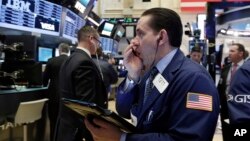Friday marked the end of the week, the month and the first fiscal quarter of 2017.
The first-quarter statistics were pretty impressive with the NASDAQ Composite delivering the best return of the three main indices of nearly 10 percent as the index broke through another record high on Friday, led by heavyweights like Apple (AAPL) and Amazon.com (AMZN).
“The trends that are driving earnings growth in that sector —- cloud computing, internet of things, mobile and tablet adoption, increasing consumption of video, et cetera —- are all intact, and an improving global economy should allow that to continue,” said Chris Zaccarelli, chief investment officer for Cornerstone Financial Partners.
The S&P 500 closed the quarter higher by its best gain since the fourth quarter of 2015. The Dow Jones industrial average added nearly 5.5 percent, which was its sixth straight positive quarter and the longest winning streak since the fourth quarter of 2006, although March showed the first monthly loss since October.
Trading week ahead
The all-important Employment Situation Report for March will be released at 8:30 a.m. ET, April 7. The federal government's employment data give the most comprehensive report of how many people are looking for jobs, how many have them, what they're getting paid and how many hours they are working. These numbers provide the best way to gauge the current state, as well as the future direction, of the economy.
Other key macro events include release of the Federal Open Market Committee (FOMC) minutes from March 14-15 on Wednesday and retail same-store sales throughout the morning on Thursday. While investors do not expect a change in the minutes from the last FOMC meeting, the release could move the markets as traders pick apart each word, looking for clues to monetary policy, when the next rate hike may occur and the amount of hikes anticipated for 2017.
Second-quarter outlook
Brad McMillan, chief investment officer at Commonwealth Financial Network, believes the second quarter will get off to a good start.
“Both consumer and business confidence continue to rise, which should provide a tailwind for faster growth,” McMillan said in a research note. “Job creation remains very strong, and wage growth also continues to rise. Around the world, both Europe and Asia are seeing faster growth, marking the first synchronized global expansion since the crisis.”
McMillan believes that the second quarter isn’t likely to repeat the first, but strong economic fundamentals, along with rising corporate earnings, could continue to push markets higher. Rising confidence will support valuation levels and also offers a real possibility of upside surprises in the hard economic data, which could translate into even better than expected earnings growth.





